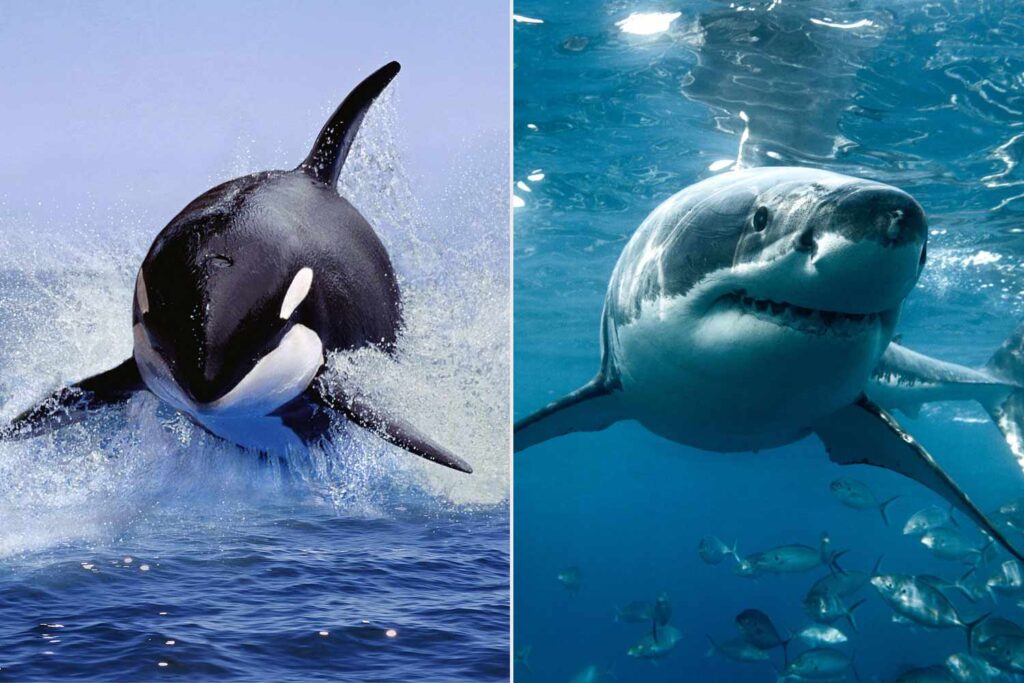
When it comes to apex predators in the ocean, two of the most formidable contenders are the shark and the orca, also known as the killer whale. Both animals are powerful, intelligent, and capable of dominating their environments. However, their hunting strategies, physical characteristics, and social behaviors differ significantly. This article will explore these differences and analyze who would likely win in a confrontation between a shark and an orca.
Overview of Sharks
Sharks are a diverse group of cartilaginous fish belonging to the subclass Elasmobranchii. They inhabit oceans worldwide and come in various species, each adapted to different marine environments. The great white shark (Carcharodon carcharias) is one of the most well-known species due to its size and predatory prowess.
Physical Characteristics of Sharks
- Size: Great white sharks can grow up to 20 feet (6 meters) long or more.
- Weight: Adult great whites typically weigh between 1,500 to 2,400 pounds (680 to 1,100 kg).
- Teeth: Sharks have multiple rows of sharp teeth designed for tearing flesh; they continuously shed and replace teeth throughout their lives.
- Sensory Systems: Sharks possess advanced sensory systems that allow them to detect vibrations and electrical fields in the water.
Overview of Orcas
Orcas, or killer whales (Orcinus orca), are the largest members of the dolphin family. They are highly intelligent marine mammals known for their complex social structures and sophisticated hunting techniques. Orcas are found in oceans all over the world and exhibit a wide range of behaviors.
Physical Characteristics of Orcas
- Size: Adult male orcas can reach lengths of up to 32 feet (9.8 meters), while females typically grow to about 28 feet (8.5 meters).
- Weight: Males can weigh up to 12,000 pounds (5,443 kg), while females generally weigh around 8,000 pounds (3,628 kg).
- Coloration: Orcas are easily recognizable due to their distinctive black-and-white coloration.
- Social Structure: Orcas live in pods consisting of family groups that work together for hunting and protection.
Key Differences Between Sharks and Orcas
The following table summarizes the primary differences between sharks and orcas:
| Feature | Shark | Orca |
|---|---|---|
| Classification | Fish (Elasmobranchii) | Mammal (Cetacea) |
| Habitat | Primarily saltwater | Found in all oceans |
| Size | Up to 20 feet (6 meters) | Up to 32 feet (9.8 meters) |
| Weight | 1,500 – 2,400 pounds (680 – 1,100 kg) | Up to 12,000 pounds (5,443 kg) |
| Social Behavior | Generally solitary | Highly social; live in pods |
| Hunting Technique | Ambush predator | Cooperative hunting strategies |
Strengths and Weaknesses
Strengths of Sharks
- Speed and Agility: Many shark species can swim quickly, with great whites reaching speeds up to 25 mph (40 km/h). Their streamlined bodies allow for swift movements in water.
- Powerful Bite Force: Sharks have strong jaws equipped with sharp teeth designed for tearing flesh. The bite force of a great white shark can exceed 1,200 PSI.
- Keen Senses: Sharks have an exceptional sense of smell and can detect vibrations in the water from long distances.
Weaknesses of Sharks
- Vulnerability on Land: Sharks cannot survive outside water; they rely entirely on aquatic environments for hunting.
- Less Adaptable Intelligence: While sharks are effective predators, they do not exhibit the same level of problem-solving skills as orcas.
Strengths of Orcas
- Intelligence: Orcas are highly intelligent animals capable of complex social interactions and problem-solving. They communicate using a variety of vocalizations.
- Cooperative Hunting: Orcas often hunt in groups using coordinated strategies that increase their chances of capturing prey.
- Powerful Predator: With strong bodies and a powerful bite force estimated at around 19,000 PSI for males, orcas can take down large marine mammals.
Weaknesses of Orcas
- Dependence on Social Structure: While orcas are social animals that benefit from living in pods, they may struggle if separated from their group during a hunt.
- Energy Requirements: Orcas require a significant amount of food daily to sustain their energy levels due to their size.
Hypothetical Confrontation Scenarios
To analyze who would win in a confrontation between a shark and an orca, we can consider different scenarios:
Scenario 1: In Open Water
In open water where both animals encounter each other:
- The orca would likely have the advantage due to its size, intelligence, and cooperative hunting strategies. An orca could outmaneuver a shark using its agility and strength.
- If an orca were part of a pod, it could coordinate attacks against a single shark effectively.
Scenario 2: Near Coastal Areas
In coastal areas where both animals might be present:
- The shark could potentially take advantage if it were able to ambush an unsuspecting orca. However, given the intelligence and social structure of orcas, they often avoid confrontations with sharks when possible.
Scenario 3: Feeding Grounds
In feeding grounds where both animals might be hunting:
- The presence of an orca pod could intimidate sharks. Studies have shown that when orcas are nearby, sharks often leave the area due to fear.
- If an orca decides to hunt a shark specifically as prey—evidenced by documented cases where orcas have successfully hunted great white sharks—it would likely prevail due to its size and strength.
Conclusion
In conclusion, while both sharks and orcas are formidable predators within their marine environments, an orca would likely win in a direct confrontation due to its size, intelligence, and cooperative hunting strategies. The great white shark is undoubtedly powerful and efficient as a solitary hunter; however, it is often outmatched by the superior capabilities of an orca.Understanding these magnificent creatures enhances our appreciation for marine life. Rather than focusing solely on hypothetical battles between species, it is essential to recognize their roles within ecosystems and promote conservation efforts aimed at protecting these incredible animals from threats such as habitat loss and climate change.Both sharks and orcas embody the wonders of ocean life; appreciating their unique adaptations allows us to advocate for their protection and ensure future generations can marvel at these magnificent predators.





